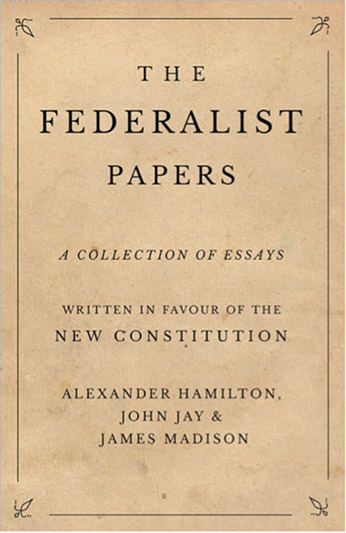By Aria Fani
Only for the third time in the history of this country, the House of Representatives may be has impeached a sitting president. Regardless of your political leaning or opinion of the president’s actions in office, it is a historical moment that merits returning to and reflecting on the writings of the Founding Fathers. In The Federalist Papers, we see the framers debate a constitutional mechanism to hold a corrupt president to account.
Therefore, impeachment is a political process created to avoid a military coup or tyrannical outcome. Although factors such as a president’s popularity, the state of the economy, partisan calculations, and policy differences are not criteria for impeachment, they do impact the process. Nonetheless, it is not these factors that make impeachment a political act; impeachment is political by nature due to the role it is assigned in the United Sates Constitution.
—Aria Fani
This article is an abridged version of a report released by the Judiciary Committee in 1974 in the aftermath of the Watergate crisis
The public debates in the state ratifying conventions offer evidence of the contemporaneous understanding of the Constitution equally as compelling as the secret deliberations of the delegates in Philadelphia. That evidence, together with the evidence found in the debates during the First Congress on the power of the President to discharge an executive officer appointed with the advice and consent of the Senate, shows that the framers intended impeachment to be a constitutional safeguard of the public trust, the powers of government conferred upon the President and other civil officers, and the division of powers among the legislative, judicial and executive departments.

The Purpose of the Impeachment Remedy
Among the weaknesses of the Articles of Confederation apparent to the delegates to the Constitutional Convention was that they provided for a purely legislative form of government whose ministers were subservient to Congress. One of the first decisions of the delegates was that their new plan should include a separate executive, judiciary, and legislature. However, the framers sought to avoid the creation of a too-powerful executive. The Revolution had been fought against the tyranny of a king and his council, and the framers sought to build in safeguards against executive abuse and usurpation of power. They explicitly rejected a plural executive, despite arguments that they were creating “the foetus of monarchy,” because a single person would give the most responsibility to the office. For the same reason, they rejected proposals for a council of advice or privy council to the executive.
The provision for a single executive was vigorously defended at the time of the state ratifying conventions as a protection against executive tyranny and wrongdoing. Alexander Hamilton made the most carefully reasoned argument in Federalist No. 70, one of the series of Federalist Papers prepared to advocate the ratification of the Constitution by the State of New York. Hamilton criticized both a plural executive and a council because they tend “to conceal faults and destroy responsibility.” A plural executive, he wrote, deprives the people of “the two greatest securities they can have for the faithful exercise of any delegated power”— “[r]esponsibility… to censure and to punishment.” When censure is divided and responsibility uncertain, “the restraints of public opinion… lose their efficacy” and “the opportunity of discovering with facility and clearness the misconduct of the persons [the public] trust, in order either to their removal from office, or to their actual punishment in cases which admit of it” is lost. A council, too, “would serve to destroy, or would greatly diminish, the intended and necessary responsibility of the Chief Magistrate himself.” It is, Hamilton concluded, “far more safe [that] there should be a single object for the jealousy and watchfulness of the people;… all multiplication of the Executive is rather dangerous than friendly to liberty.”
James Iredell, who played a leading role in the North Carolina ratifying convention and later became a justice of the Supreme Court, said that under the proposed Constitution the President “is of a very different nature from a monarch. He is to be… personally responsible for any abuse of the great trust reposed in him.” In the same convention, William R. Davie, who had been a delegate in Philadelphia, explained that the “predominant principle” on which the Convention had provided for a single executive was “the more obvious responsibility of one person.” When there was but one man, said Davie, “the public were never at a loss” to fix the blame.
James Wilson, in the Pennsylvania convention, described the security furnished by a single executive as one of its very important advantages,” stating: The executive power is better to be trusted when it has no screen. Sir, we have a responsibility in the person of our President; he cannot act improperly, and hide either his negligence or inattention; he cannot roll upon any other person the weight of his criminality; no appointment can take place without his nomination; and he is responsible for every nomination he makes… Add to all this, that officer is placed high, and is possessed of power far from being contemptible, yet not a single privilege, is annexed to his character; far from being above the laws, he is amenable to them in his private character as a citizen, and in his public character by impeachment.
As Wilson’s statement suggests, the impeachability of the President was considered to be an important element of his responsibility.
Impeachment had been included in the proposals before the Constitutional Convention from its beginning. A specific provision, making the executive removable from office on impeachment and conviction for “mal-practice or neglect of duty,” was unanimously adopted even before it was decided that the executive would be a single person.”
The only major debate on the desirability of impeachment occurred when it was moved that the provision for impeachment be dropped, a motion that was defeated by a vote of eight states to two.
One of the arguments made against the impeachability of the executive was that he “would periodically be tried for his behavior by his electors” and “ought to be subject to no intermediate trial, by impeachment.” Another was that the executive could “do no criminal act without Coadjutors [assistants] who may be punished. Without his subordinates, it was asserted, the executive “can do nothing of consequence,” and they would “be amenable by impeachment to the public Justice.”
This latter argument was made by Gouveneur Morris of Pennsylvania, who abandoned it during the course of the debate, concluding that the executive should be impeachable. Before Morris changed his position, however, George Mason had replied to his earlier argument:
Shall any man be above justice? Above all shall that man be above it, who can commit the most extensive injustice? When great crimes were committed he was for punishing the principal as well as the Coadjutors.
James Madison of Virginia argued in favor of impeachment stating that some provision was “indispensable” to defend the community against “the incapacity, negligence or perfidy of the chief Magistrate.” With a single executive, Madison argued, unlike a legislature whose collective nature provided security, “loss of capacity or corruption was more within the compass of probable events, and either of them might be fatal to the Republic.” Benjamin Franklin supported impeachment as “favorable to the executive”; where it was not available and the chief magistrate had “rendered himself obnoxious,” recourse was had to assassination. The Constitution should provide for the “regular punishment of the Executive when his misconduct should deserve it, and for his honorable acquittal when he should be unjustly accused. Edmund Randolph also defended “the propriety of impeachments”:
The Executive will have great opportunities of abusing his power; particularly in time of war when the military force, and in some respects the public money will be in his hands. Should no regular punishment be provided it will be irregularly inflicted by tumults & insurrections.
The one argument made by the opponents of impeachment to which no direct response was made during the debate was that the executive would be too dependent on the legislature— that, as Charles Pinckney put it, the legislature would hold impeachment “as a rod over the Executive and by that means effectually destroy his independence.” That issue which involved the forum for trying impeachments and the mode of electing the executive, troubled the Convention until its closing days. Throughout its deliberations on ways to avoid executive subservience to the legislature, however, the Convention never reconsidered its early decision to make the executive removable through the process of impeachment.
Grounds for Impeachment
Contemporaneous comments on the scope of impeachment are persuasive as to the intention of the framers. In Federalist No. 65, Alexander Hamilton described the subject of impeachment as:
those offences which proceed from the misconduct of public men, or, in other words, from the abuse or violation of some public trust. They are of a nature which may with peculiar propriety be denominated POLITICAL, as they relate chiefly to injuries done immediately to the society itself.
Comments in the state ratifying conventions also suggest that those who adopted the Constitution viewed impeachment as a remedy for usurpation or abuse of power or serious breach of trust. Thus, Charles Cotesworth Pinckney of South Carolina stated that the impeachment power of the House reaches “those who behave amiss, or betray their public trust.” Edmund Randolph said in the Virginia convention that the President may be impeached if he “misbehaves.” He later cited the example of the President’s receipt of presents or emoluments from a foreign power in violation of the constitutional prohibition of Article I, section 9. In the same convention George Mason argued that the President might use his pardoning power to “pardon crimes which were advised by himself” or, before indictment or conviction, “to stop inquiry and prevent detection.” James Madison responded:
[I]f the President be connected in any suspicious manner with any person, and there be grounds to believe he will shelter him, the House of Representatives can impeach him; they can remove him if found guilty…
In reply to the suggestion that the President could summon the Senators of only a few states to ratify a treaty, Madison said,
Were the President to commit any thing so atrocious… he would be impeached and convicted, as a majority of the states would be affected by his misdemeanor.
Edmund Randolph referred to the checks upon the President:
It has too often happened that powers delegated for the purpose of promoting the happiness of a community have been perverted to the advancement of the personal emoluments of the agents of the people; but the powers of the President are too well guarded and checked to warrant this illiberal aspersion.
Randolph also asserted, however, that impeachment would not reach errors of judgment: “No man ever thought of impeaching a man for an opinion. It would be impossible to discover whether the error in opinion resulted from a wilful mistake of the heart, or an involuntary fault of the head.”
James Iredell made a similar distinction in the North Carolina convention, and on the basis of this principle said, “I suppose the only instances, in which the President would be liable to impeachment, would be where he had received a bribe, or had acted from some corrupt motive or other.” But he went on to argue that the President:
Must certainly be punishable for giving false information to the Senate. He is to regulate all intercourse with foreign powers, and it is his duty to impart to the Senate every material intelligence he receives. If it should appear that he has not given them full information, but has concealed important intelligence which he ought to have communicated, and by that means induced them to enter into measures injurious to their country, and which they would not have consented to had the true state of things been disclosed to them, – in this case, I ask whether, upon an impeachment for a misdemeanor upon such an account, the Senate would probably favor him.
In short the framers who discussed impeachment in the state ratifying conventions, as well as other delegates who favored the Constitution, implied that it reached offenses against the government, and especially abuses of constitutional duties. The opponents did not argue that the grounds for impeachment had been limited to criminal offenses.
Another framer, Abraham Baldwin of Georgia, who supported Madison’s position on the power to remove subordinates, spoke of the President’s impeachability for failure to perform the duties of the Executive. If, said Baldwin, the President “in a fit of passion” removed “all the good officers of the Government” and the Senate were unable to choose qualified successors, the consequence would be that the President “would be obliged to do the duties himself; or, if he did not, we would impeach him, and turn him out of office, as he had done others.”
Those who asserted that the President has exclusive removal power suggested that it was necessary because impeachment, as Elias Boudinot of New Jersey contended, is “intended as a punishment for a crime, and not intended as the ordinary means of re-arranging the Departments”. Boudinot suggested that disability resulting from sickness or accident “would not furnish any good ground for impeachment; it could not be laid as treason or bribery, nor perhaps as a high crime or misdemeanor.” Fisher Ames of Massachusetts argued for the President’s removal power because “mere intention [to do a mischief] would not be cause of impeachment” and “there may be numerous causes for removal which do not amount to a crime.” Later in the same speech Ames suggested that impeachment was available if an officer “misbehaves” and for “mal-conduct.”
From the comments of the framers and their contemporaries, the remarks of the delegates to the state ratifying conventions, and the removal power debate in the First Congress, it is apparent that the scope of impeachment was not viewed narrowly. It was intended to provide a check on the President through impeachment, but not to make him dependent on the unbridled will of the Congress.


















